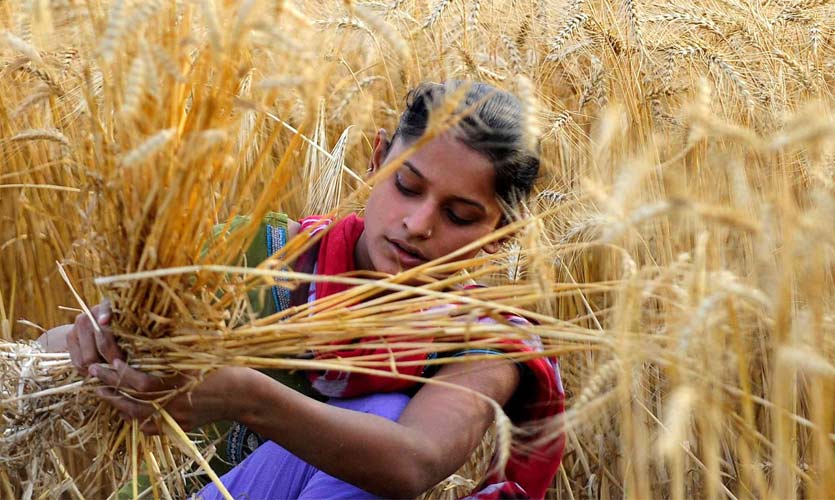In a bid to calm farmers amidst the ongoing protests in the northern part of the country, the Centre, on September 8, announced an early increase in the minimum support price (MSP) of six rabi crops for the 2022-23 season. While the highest percentage hike – 8.6 percent – was given to mustard and rapeseed, the MSP increase for wheat was just 2 percent – the lowest in twelve years.
The increase in the MSP of rabi crops like barley, gram, lentils, rapeseed and mustard, and safflower was in the range of 2.14 percent to 8.60 percent. The highest increase of ₹400 per quintal, in absolute terms, was given to lentils, rapeseed and mustard. The hike percentage of lentils is 7.84 percent. The MSP of barley has been fixed to ₹1,635 per quintal for 2021-22, compared to ₹1,600 per quintal during the previous year – a hike of ₹35. Among the pulses, the MSP for gram has been set to ₹5,230 per quintal – an increase of ₹130 from the last year, and that of lentils has been hiked by ₹400 to ₹5,550 per quintal.
MSP for wheat during 2022-23 has been fixed at ₹2,015 per quintal — which is just ₹40 more than ₹1,975 during the current year. According to data made available by the Ministry of Agriculture, the increase in the rate of MSP of wheat has been steadily dropping since 2017-18. In 2017-18, it was hiked by 6.77 percent, with a lower increase of 6.05 percent in 2018-19, 4.62 percent in 2019-20 and 2.60 percent in 2020-21. Noteworthy, India is the second largest consumer of wheat in the world. Punjab and Haryana – the two states mostly witnessing the farmers’ protests – are the largest suppliers of wheat in the country. During the rabi marketing season of 2021-22, out of 433.32 lakh metric tonnes of wheat, a little over half was procured from Punjab and Haryana.
Over a tweet, Prime Minister Narendra Modi said that the government has taken yet another big step in the interests of the farmers of the country by increasing MSPs on rabi crops, which will ensure remunerative prices to farmers and encourage them for sowing operations. Lauding the hike in the MSP, Agriculture Minister Narendra Singh Tomar mentioned in a statement, “Some people who are spreading the illusion that MSP will be abolished should also learn from this decision. After the passage of the new agricultural reform laws, not only have the rates of MSP increased but there has also been a continuous increase in the procurement by the government.”
MSP is the price at which the government purchases crops from the farmers, and the hikes are to encourage farmers to opt for crop diversification and boost production. According to a statement released by the central government, the increase in the minimum support price “for all mandated Rabi crops for Rabi Marketing Season (RMS) 2022-23” was “approved” by the Cabinet Committee on Economic Affairs (CCEA) chaired by the prime minister.
In the statement, the Centre mentioned, “The expected returns to farmers over their cost of production are estimated to be highest in case of wheat and rapeseed & mustard (100% each), followed by lentil (79%); gram (74%); barley (60%); safflower (50%). The increase in MSP for Rabi Crops for RMS 2022-23 is in line with the Union Budget 2018-19 announcement of fixing the MSPs at a level of at least 1.5 times of the all-India weighted average cost of production, aiming a reasonably fair remuneration for the farmers.”
“Concerted efforts were made over the last few years to realign the MSPs in favour of oilseeds, pulses and coarse cereals to encourage farmers shift to larger areas under these crops and adopt best technologies and farm practices, to correct demand — supply imbalance,” said the government. It added, “Additionally, National Mission on Edible Oils-Oil Palm (NMEO-OP), the centrally sponsored scheme recently announced by the Government, will help in increasing the domestic production of edible oils and reduce imports dependency.”
Read more: Muzaffarnagar Kisan Mahapanchyat: Five Points You Need To Know
The RSS-affiliated farmers union – Bharatiya Kisan Sangh (BKS) – who are an active part of the farmers’ protests, welcomed the MSP hikes. However, the BKS also underlined that most farmers would not benefit from the hikes as they will still be unable to sell their crops at that rate. According to the Hindu’s report, BKS general secretary Badrinarayan Chaudhary said, “We welcome this attempt to diversify crops and encourage pulses and oilseeds like masoor and sarson (mustard). The water and labour costs are lower for these crops, and since the MSP has been increased, profits should be higher for farmers. Our ‘andolan’ remains because the government does not procure crops from all farmers. We still want a law which will guarantee remunerative prices for all.”
Unions under the Samyukt Kisan Morcha (SKM) highlighted that the rate of increase in the MSP still remains lower than the rate of inflation for most crops. The SKM, who are now in the tenth month of protest against the reformed farm laws, cited that the MSP hike in the case of wheat has actually dropped by 4 percent.










